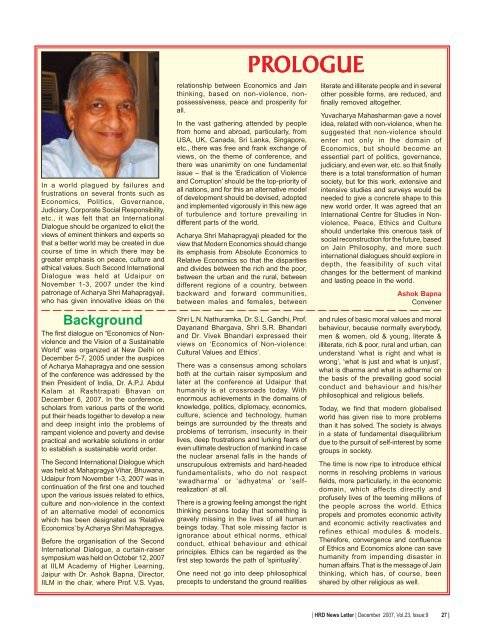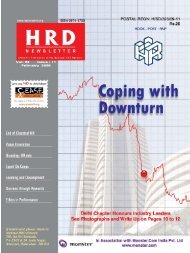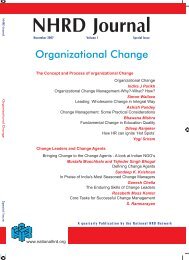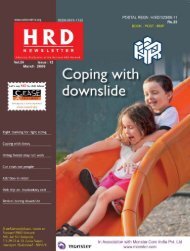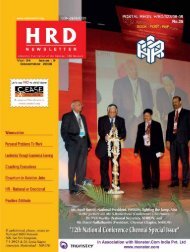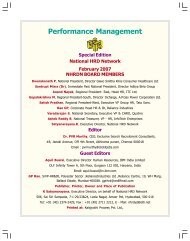Challenge for HR - National HRD Network
Challenge for HR - National HRD Network
Challenge for HR - National HRD Network
You also want an ePaper? Increase the reach of your titles
YUMPU automatically turns print PDFs into web optimized ePapers that Google loves.
In a world plagued by failures and<br />
frustrations on several fronts such as<br />
Economics, Politics, Governance,<br />
Judiciary, Corporate Social Responsibility,<br />
etc., it was felt that an International<br />
Dialogue should be organized to elicit the<br />
views of eminent thinkers and experts so<br />
that a better world may be created in due<br />
course of time in which there may be<br />
greater emphasis on peace, culture and<br />
ethical values. Such Second International<br />
Dialogue was held at Udaipur on<br />
November 1-3, 2007 under the kind<br />
patronage of Acharya Shri Mahapragyaji,<br />
who has given innovative ideas on the<br />
Background<br />
The first dialogue on “Economics of Nonviolence<br />
and the Vision of a Sustainable<br />
World” was organized at New Delhi on<br />
December 5-7, 2005 under the auspices<br />
of Acharya Mahapragya and one session<br />
of the conference was addressed by the<br />
then President of India, Dr. A.P.J. Abdul<br />
Kalam at Rashtrapati Bhavan on<br />
December 6, 2007. In the conference,<br />
scholars from various parts of the world<br />
put their heads together to develop a new<br />
and deep insight into the problems of<br />
rampant violence and poverty and devise<br />
practical and workable solutions in order<br />
to establish a sustainable world order.<br />
The Second International Dialogue which<br />
was held at Mahapragya Vihar, Bhuwana,<br />
Udaipur from November 1-3, 2007 was in<br />
continuation of the first one and touched<br />
upon the various issues related to ethics,<br />
culture and non-violence in the context<br />
of an alternative model of economics<br />
which has been designated as ‘Relative<br />
Economics’ by Acharya Shri Mahapragya.<br />
Be<strong>for</strong>e the organisation of the Second<br />
International Dialogue, a curtain-raiser<br />
symposium was held on October 12, 2007<br />
at IILM Academy of Higher Learning,<br />
Jaipur with Dr. Ashok Bapna, Director,<br />
IILM in the chair, where Prof. V.S. Vyas,<br />
PROLOGUE<br />
relationship between Economics and Jain<br />
thinking, based on non-violence, nonpossessiveness,<br />
peace and prosperity <strong>for</strong><br />
all.<br />
In the vast gathering attended by people<br />
from home and abroad, particularly, from<br />
USA, UK, Canada, Sri Lanka, Singapore,<br />
etc., there was free and frank exchange of<br />
views, on the theme of conference, and<br />
there was unanimity on one fundamental<br />
issue – that is the ‘Eradication of Violence<br />
and Corruption’ should be the top-priority of<br />
all nations, and <strong>for</strong> this an alternative model<br />
of development should be devised, adopted<br />
and implemented vigorously in this new age<br />
of turbulence and torture prevailing in<br />
different parts of the world.<br />
Acharya Shri Mahapragyaji pleaded <strong>for</strong> the<br />
view that Modern Economics should change<br />
its emphasis from Absolute Economics to<br />
Relative Economics so that the disparities<br />
and divides between the rich and the poor,<br />
between the urban and the rural, between<br />
different regions of a country, between<br />
backward and <strong>for</strong>ward communities,<br />
between males and females, between<br />
Shri L.N. Nathuramka, Dr. S.L. Gandhi, Prof.<br />
Dayanand Bhargava, Shri S.R. Bhandari<br />
and Dr. Vivek Bhandari expressed their<br />
views on ‘Economics of Non-violence:<br />
Cultural Values and Ethics’.<br />
There was a consensus among scholars<br />
both at the curtain raiser symposium and<br />
later at the conference at Udaipur that<br />
humanity is at crossroads today. With<br />
enormous achievements in the domains of<br />
knowledge, politics, diplomacy, economics,<br />
culture, science and technology, human<br />
beings are surrounded by the threats and<br />
problems of terrorism, insecurity in their<br />
lives, deep frustrations and lurking fears of<br />
even ultimate destruction of mankind in case<br />
the nuclear arsenal falls in the hands of<br />
unscrupulous extremists and hard-headed<br />
fundamentalists, who do not respect<br />
‘swadharma’ or ‘adhyatma’ or ‘selfrealization’<br />
at all.<br />
There is a growing feeling amongst the right<br />
thinking persons today that something is<br />
gravely missing in the lives of all human<br />
beings today. That sole missing factor is<br />
ignorance about ethical norms, ethical<br />
conduct, ethical behaviour and ethical<br />
principles. Ethics can be regarded as the<br />
first step towards the path of ‘spirituality’.<br />
One need not go into deep philosophical<br />
precepts to understand the ground realities<br />
literate and illiterate people and in several<br />
other possible <strong>for</strong>ms, are reduced, and<br />
finally removed altogether.<br />
Yuvacharya Mahasharman gave a novel<br />
idea, related with non-violence, when he<br />
suggested that non-violence should<br />
enter not only in the domain of<br />
Economics, but should become an<br />
essential part of politics, governance,<br />
judiciary, and even war, etc. so that finally<br />
there is a total trans<strong>for</strong>mation of human<br />
society, but <strong>for</strong> this work, extensive and<br />
intensive studies and surveys would be<br />
needed to give a concrete shape to this<br />
new world order. It was agreed that an<br />
International Centre <strong>for</strong> Studies in Nonviolence,<br />
Peace, Ethics and Culture<br />
should undertake this onerous task of<br />
social reconstruction <strong>for</strong> the future, based<br />
on Jain Philosophy, and more such<br />
international dialogues should explore in<br />
depth, the feasibility of such vital<br />
changes <strong>for</strong> the betterment of mankind<br />
and lasting peace in the world.<br />
Ashok Bapna<br />
Convener<br />
and rules of basic moral values and moral<br />
behaviour, because normally everybody,<br />
men & women, old & young, literate &<br />
illiterate, rich & poor, rural and urban, can<br />
understand ‘what is right and what is<br />
wrong’, ‘what is just and what is unjust’,<br />
what is dharma and what is adharma’ on<br />
the basis of the prevailing good social<br />
conduct and behaviour and his/her<br />
philosophical and religious beliefs.<br />
Today, we find that modern globalised<br />
world has given rise to more problems<br />
than it has solved. The society is always<br />
in a state of fundamental disequilibrium<br />
due to the pursuit of self-interest by some<br />
groups in society.<br />
The time is now ripe to introduce ethical<br />
norms in resolving problems in various<br />
fields, more particularly, in the economic<br />
domain, which affects directly and<br />
profusely lives of the teeming millions of<br />
the people across the world. Ethics<br />
propels and promotes economic activity<br />
and economic activity reactivates and<br />
refines ethical modules & models.<br />
There<strong>for</strong>e, convergence and confluence<br />
of Ethics and Economics alone can save<br />
humanity from impending disaster in<br />
human affairs. That is the message of Jain<br />
thinking, which has, of course, been<br />
shared by other religious as well.<br />
| <strong>HR</strong>D News Letter | December 2007, Vol.23, Issue:9 27 |


